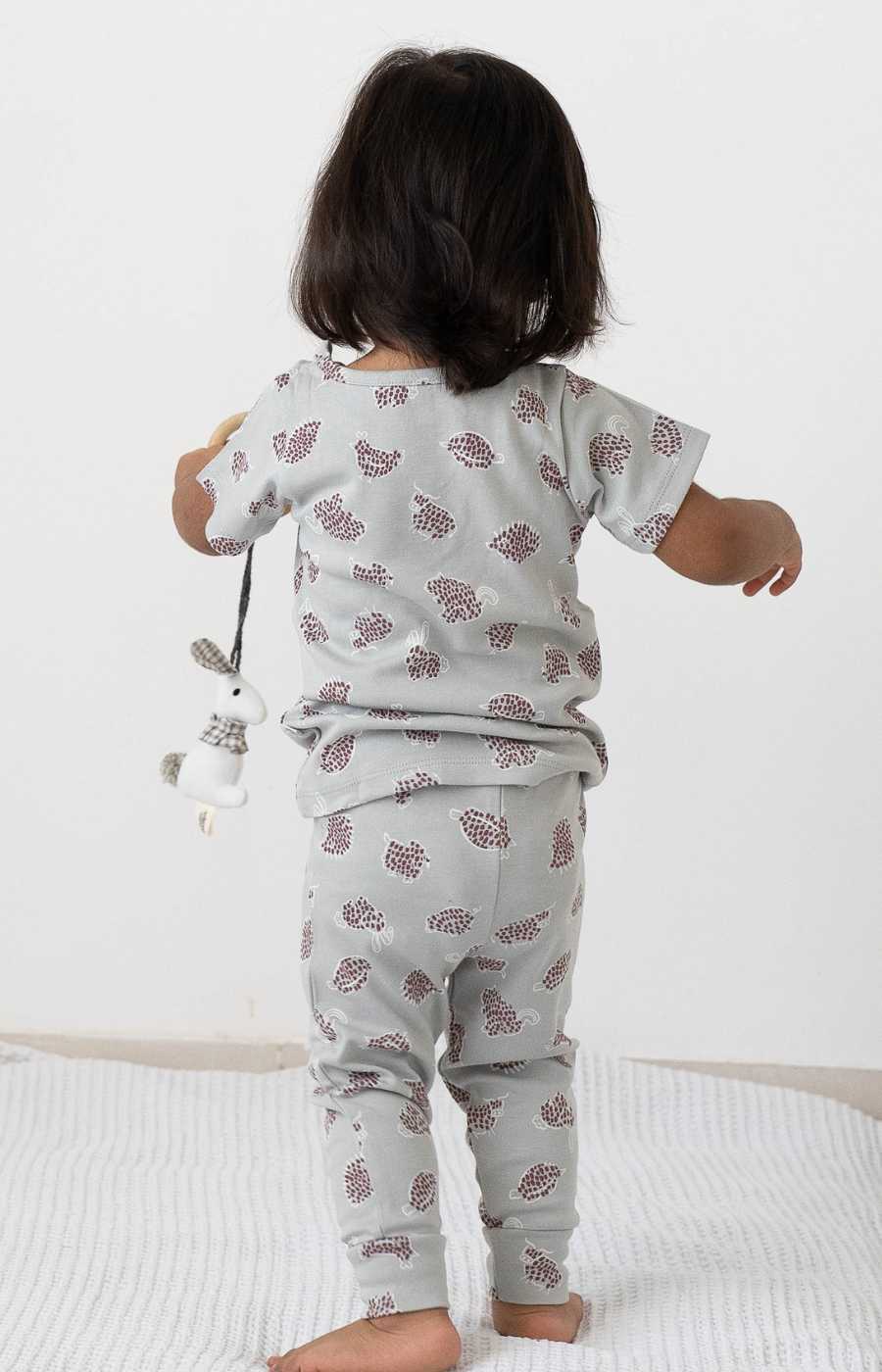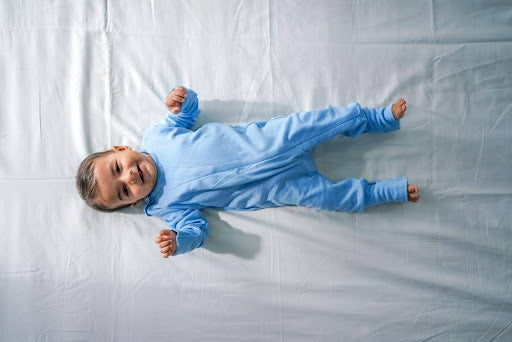Key Takeaways
-
Parents, sleep regression does not last forever, and love, patience, and comfort can make this period easier. From figuring out if it is teething or sleep regression, to learning about how to soothe a teething baby to sleep, small steps can truly make a big difference.
-
When a baby is teething and won't sleep, they just need comfort. When you approach teething baby sleep training the right way, you can gently guide them back to better rest, that too without adding stress to your or your little one's life.
In This Article
Why Does Sleep Regression Happen During Teething?
Understanding Teething Sleep Disruptions: What To Expect
Baby Sleep Cycles Vs Teething Discomfort
9 Expert Tips To Manage Sleep Regression During Teething
Introduction
Do you feel that whenever your child starts sleeping better, something new comes along to shake things up? Well, you're not imagining it, and you are definitely not alone!
From growth spurts and travel to teething, many things can cause a certain shift in your child's sleep. But one of the most common culprits is teething. While those new teeth definitely bring sweet little smiles, the process of getting them can throw sleep into complete chaos.
If your little bundle of joy has gone from sleeping peacefully to waking up multiple times at night, fighting naps, or needing extra snuggles and comfort feed at night, teething could very well be the reason. In this blog, we will help you understand why teething and sleep regression are connected and how to soothe a teething baby to sleep.
Why Does Sleep Regression Happen During Teething?
Around three to four months of age, babies go through a significant biological change in how they sleep. As they transition from the newborn-style deep sleep into more adult-like sleep cycles, the transition can cause the infamous sleep regression, where babies wake more frequently and struggle to fall back asleep on their own. Now, add teething pain into the mix and parents, you've got yourself a double whammy. While most babies begin teething between four and seven months, some can start as early as three months. So if your baby is teething and going through a natural sleep transition, they may experience:
-
frequent night wakings
-
fussiness
-
resistance to bedtime
-
increased crying
-
clinginess
-
feeding disruptions
This phase is tough for both babies and parents, but understanding what is happening can help you respond with more patience, empathy, and effective support.
Understanding Teething Sleep Disruptions: What To Expect
Parents, teething might not be the only reason for poor sleep, but it can definitely make things worse, especially when your baby is already traversing through other developmental changes. Take a look at some common signs of teething-related sleep disruptions.
-
Your baby wakes up 10-20 minutes after falling asleep.
-
Naps become shorter, or your baby might want to skip a nap entirely.
-
You can notice gum swelling, excessive drooling, or chewing on hands.
-
Your child is fussy, both during the day and at night.
-
You feel that your baby is refusing to feed.
Baby Sleep Cycles Vs Teething Discomfort
|
Aspect |
Baby Sleep Cycle |
Teething Discomfort |
|
Definition |
The natural pattern of sleep stages a baby goes through (light, deep, REM) |
Pain and irritation caused by emerging teeth breaking through the gums |
|
Age of Onset |
Starts from birth and evolves as baby grows |
Typically starts around 4–7 months |
|
Typical Duration |
Ongoing; adjusts over weeks/months as baby matures |
Can last a few days to weeks per tooth |
|
Sleep Disruption Cause |
Immature sleep cycles, growth spurts, regressions |
Gum pain, inflammation, restlessness due to discomfort |
|
Signs and Symptoms |
Frequent waking, shorter naps, sleep regression, night feeds |
Drooling, gum rubbing, irritability, chewing, swollen gums, low-grade fever |
|
Daytime Impact |
Fussiness, crankiness, shorter wake windows |
Crankiness, desire to chew everything, disrupted feeds |
|
Relief/Support |
Consistent routines, white noise, swaddling, rocking |
Teethers, gum massage, cool cloths, doctor-approved pain relief |
|
Duration of Night Waking |
Can occur frequently during regressions or growth phases |
Usually wakes the baby during peak teething pain |
|
Need for Medical Advice |
Usually not unless persistent, severe sleep issues |
Yes, if accompanied by fever >101°F, diarrhoea, or signs of infection |
|
Can Both Happen Together? |
Yes, especially between 4–12 months |
Yes, leading to more pronounced sleep disturbances |
9 Expert Tips To Manage Sleep Regression During Teething
When your baby is cutting teeth and suddenly stops sleeping well, it is normal to wonder if it is teething or sleep regression. Well, the truth is that it can be both. Teething and sleep regression can turn peaceful nights into really restless ones. But don't worry, with the right tips, you can manage and navigate through this phase like a pro. [1]
1. Soothe Sore Gums
A teething baby's gums are tender, and this makes sleep tricky. You can use a chilled teether or teething toys to massage gums before bedtime. This can help ease discomfort so your teething baby's sleep is less disrupted.
2. Stick To A Bedtime Routine
Even when the nights get rough, keep the best bedtime routine for teething babies consistent. It could be bath, cuddling, massage, feeding, and lights out. Whatever it is, consistency is going to tell a baby's brain that it's time to rest.
3. Offer Extra Comfort And Cuddles
During sleep regression, it is normal for babies to crave more closeness. Skin-to-skin cuddles, rocking, or even soft singing can really help. You can use Cocoon Care’s baby swaddles or swaddle pods to make your little one feel calmer and secure.
4. Try Safe Teething Toys
A teething baby's sleep training can include safe gum-soothing toys before bedtime. This can reduce night wakings and help your little one settle faster.
5. Keep The Room Cool And Calm
One of the most common signs that teething is affecting your baby's sleep is that your child is going to become very fussy at night. To manage this, try to maintain a cool, dark, and quiet room. Dress them in comfortable and breathable sleeping suits for babies to avoid overheating.
6. Use Pacifiers Wisely
Pacifiers can be a great tool to soothe a teething baby’s sleep, but it is very important not to turn them into the only sleep crutch. Offer it for comfort, and then you can gently remove it once they are drowsy.
7. Be Flexible With Sleep Schedules
Managing baby sleep regression during teething can mean letting go of strict nap times. Shorter naps and later bedtimes are acceptable. After all, your baby’s body needs time to adjust.
8. Prepare For Night Wakings
When you know that your child might wake up in the middle of the night, you are invariably less stressed. Keep teethers, pacifiers, and baby sleep products like swaddles and baby sleeping bags handy. These are going to be your nighttime lifesavers.
9. Take Care Of Yourself, Too
A tired parent cannot comfort well. Make sure that you share nighttime duties with your partner or any other family member. Nap when you can, and please do not hesitate to ask for help. If you're wondering how long teething and sleep regression last? Well, it usually lasts a few days to weeks, and this too shall pass.

References
[1] https://www.healthline.com/health/baby/how-to-soothe-a-teething-baby-at-night#perspective
FAQs on Sleep Regression
1. How long does sleep regression last during teething?
It usually lasts from a few days to a couple of weeks. It depends on how many teeth are erupting.
2. How can I soothe my baby’s gums at night?
Fussiness, gum rubbing, biting, and frequent night wakings are clear signs that teething is affecting the baby's sleep.
3. Is it okay to feed my baby more often at night while teething?
Comfort feeding is fine during sleep regression. However, make sure that it doesn’t replace your child’s proper day feeds.
4. What’s the best room temperature for a teething baby?
A cool temperature of 24–26°C paired with light cotton baby night suits can create a conducive environment for your teething baby’s sleep.
Related blogs
With Love, from Cocoon Care
Dear Parent,
No matter where you are, your baby deserves gentle beginnings and comforting care. At Cocoon Care, we pour love into every stitch. From soft muslin baby swaddles to cozy sleep pods and thoughtfully made newborn clothing, our essentials hold your baby with the same tenderness as you do. You can find baby essentials on our website and also on Amazon, Firstcry, Myntra, Nykaa Fashion and DuckDuck baby.
Because every baby deserves to be cocooned in care.
About the Author: The Cocoon Care Editorial Team works with pediatric consultants and experienced parents to bring you baby care tips you can trust.
Popular Searches
Baby Romper | Baby Blankets | Swaddle Cloth | Baby Shopping Online | Baby Night Dress | Baby Headbands | Infant Clothes | Baby Bath Towels | Newborn Baby Gifts | Baby Bibs | Mittens For Baby | Baby Sleep Sack | Bottom Wear | Sleep Essentials | Burp Cloths | Nappy For Baby















